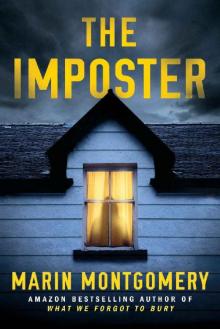- Home
- Marin Montgomery
The Imposter
The Imposter Read online
OTHER TITLES BY MARIN MONTGOMERY
What We Forgot to Bury
The Perfect Stranger
Into the Night
All the Pretty Lies
The House without a Key
The Ruined Wife
The Girl That Got Away
Because You’re Mine
This is a work of fiction. Names, characters, organizations, places, events, and incidents are either products of the author’s imagination or are used fictitiously. Any resemblance to actual persons, living or dead, or actual events is purely coincidental.
Text copyright © 2021 by Wilted Lilly LLC
All rights reserved.
No part of this book may be reproduced, or stored in a retrieval system, or transmitted in any form or by any means, electronic, mechanical, photocopying, recording, or otherwise, without express written permission of the publisher.
Published by Thomas & Mercer, Seattle
www.apub.com
Amazon, the Amazon logo, and Thomas & Mercer are trademarks of Amazon.com, Inc., or its affiliates.
ISBN-13: 9781542022989
ISBN-10: 1542022983
Cover design by Anna Laytham
When I started writing this book, I never thought it would be from a mandated and not self-imposed quarantine or that we would witness a deadly virus straight out of a Stephen King novel, invading our lives and changing them in such fundamental ways. It has changed our routines and given most of us a “new normal.”
I’d like to dedicate this book to all the essential and nonessential workers on the front lines who have risked their lives to provide those at home the opportunity to do just that—stay at home. I am one of the lucky ones who was sick but not to the extent I required hospitalization.
A special dedication goes to Dr. Li Wenliang, an ophthalmologist at Wuhan Central Hospital, who died February 7, 2020, at the age of thirty-three. Not only was he the first whistleblower to try to alert the public and his fellow doctors about the virus, but he also ultimately succumbed to it.
He was punished for his actions by his own government.
He is survived by his wife, their young child, and, at the time of this writing, an unborn baby.
CONTENTS
PROLOGUE Deborah
PART ONE DEBORAH
CHAPTER 1 Deborah
CHAPTER 2 Deborah
CHAPTER 3 Deborah
CHAPTER 4 Deborah
CHAPTER 5 Deborah
PART TWO SIBLEY
CHAPTER 6 Sibley
CHAPTER 7 Sibley
CHAPTER 8 Sibley
CHAPTER 9 Sibley
CHAPTER 10 Sibley
CHAPTER 11 Sibley
CHAPTER 12 Sibley
CHAPTER 13 Sibley
CHAPTER 14 Sibley
PART THREE SIBLEY & DEBORAH
CHAPTER 15 Sibley
CHAPTER 16 Deborah
CHAPTER 17 Sibley
CHAPTER 18 Sibley
CHAPTER 19 Sibley
CHAPTER 20 Deborah
CHAPTER 21 Sibley
CHAPTER 22 Deborah
CHAPTER 23 Sibley
CHAPTER 24 Deborah
CHAPTER 25 Sibley
CHAPTER 26 Deborah
CHAPTER 27 Sibley
CHAPTER 28 Deborah
CHAPTER 29 Sibley
CHAPTER 30 Deborah
CHAPTER 31 Sibley
CHAPTER 32 Deborah
CHAPTER 33 Sibley
CHAPTER 34 Deborah
CHAPTER 35 Deborah
CHAPTER 36 Sibley
CHAPTER 37 Deborah
CHAPTER 38 Sibley
CHAPTER 39 Deborah
CHAPTER 40 Sibley
CHAPTER 41 Deborah
CHAPTER 42 Sibley
CHAPTER 43 Sibley
CHAPTER 44 Sibley
CHAPTER 45 Deborah
CHAPTER 46 Sibley
CHAPTER 47 Deborah
CHAPTER 48 Deborah
CHAPTER 49 Sibley
CHAPTER 50 Deborah
CHAPTER 51 Deborah
CHAPTER 52 Sibley
CHAPTER 53 Sibley
CHAPTER 54 Sibley
CHAPTER 55 Deborah
EPILOGUE Sibley
ABOUT THE AUTHOR
PROLOGUE
Deborah
Six Months Ago
Getting the mail should be an easy feat, except in this case, it’s minus five degrees, and the blustery cold unavoidably renders Deborah’s limbs numb.
She can’t feel her face, even though it’s mostly covered by a wool scarf, and her toes are frozen stiff as she trudges through the deep snow.
It doesn’t help that the mailbox isn’t twenty feet away but at the end of a long, winding gravel driveway, smack dab in the middle of a colorless sky, a subtle hint more snow is on the way.
Groaning, she curses the dreary landscape.
The mailbox is the only vibrant speck in the distance, a forest-green metal container with a neon-orange flag that sticks out like a sore thumb in the drabness.
Midwesterners do this every cold season once the promise of sunshine and bearable temperatures arrives. They swear it’ll be their last, but the spring, summer, and fall make up for the bitter winter. By the time the last of the snow melts and the sunshine reappears, it’s a fading memory—out of sight, out of mind.
Deborah angrily tosses her head, the blast of cold air penetrating the thick material of her down coat. Her rail-thin frame is made hulking by the layers of clothing—a turtleneck, a heavy sweater, and a wool coat. If anyone spotted her barely five-foot stature, they’d think she was a miniature version of an adult, playing dress-up in her mother’s clothing.
Sticking her bulky glove inside the metal tin, she predicts bills and the hometown newspaper and, at her age, maybe an AARP magazine.
She’s not wrong, but there’s one more package—a manila envelope that takes up the width of the box but is thin, the edges creased to make room for it to fit.
She’s unable to grasp the mail firmly in her bulky glove, and a gust of wind almost takes the contents from her clumsy grip. She yanks her glove off with her mouth, and it’s mere seconds before her fingers succumb to the winter’s version of a sunburn—windburn.
The handwriting’s unrecognizable, though it appears feminine, due to the impeccable cursive spelling out of her address in broad swoops and curlicues.
No name is listed as the return sender, only a scribbled post office box.
Curious, but not enough to withstand any more blasts of wind, Deborah replaces her glove and lumbers back to the farmhouse, worn out and exhausted from her one errand of the day, the trek down the driveway exacerbating her depressing outlook on the unchanged scenery.
After cranking the thermostat to a temperature on par with a kiln, she curls up underneath an heirloom quilt from her deceased mother and sorts through the other mail before carefully opening the slim package.
Deborah gasps when a single picture falls into her lap.
Her hands shake as she scans the letter written on pale-yellow stationery.
No, this can’t be.
This is too unbelievable.
Teetering between clutching it securely in her fist and gently examining it, she instead smooths the creases with her fingertips. The photograph’s wrinkled, having been folded up and then flattened out. The lines draw a likeness to the worry etched on her face, all the years she can’t erase of existing solely as a beating heart, thudding in her chest, on pace with her brain, ticking steadily, ready to detonate at any given moment.
Deborah wishes she could blot them out in one fluid ripple, all the hurt and sleepless nights, the impossible task of trying to move forward.
But more than that, live.
In
those days, it was called a nervous breakdown; now it’s referred to as an acute stress disorder, as if the change provides comfort to the sufferer. It makes no difference to her what you call it, what label you package it up with to sell to patients; the trauma is no less real.
A significant part of her died that day, and Deborah likens it to missing a limb. People might learn to live without it because they have to, but they never forget it’s missing. Deborah knew she would never be whole again, but she took baby steps to move forward because it wasn’t just her life she had to consider.
But here on her lap, the words jump off the page at her, and never in a million years did Deborah expect this would be in her mailbox.
Cautiously optimistic, she rereads the paragraph over and over, squinting at the out-of-focus words, until she remembers she needs her reading glasses.
Terrified to see the writing sharpened, she holds the paper in her trembling hand.
Dear Deborah,
(Or maybe I should call you Mother, but it sounds strange after all this time.)
I’m sure this picture brings up lots of questions—namely, what happened at the hospital all those years ago. You were led to believe it was a tragedy, and it was, but of a different proportion.
I have asked myself what I should do over the years, the voice inside my head telling me to let go of some of the hurt, anger, and blame. We all make choices that sometimes have unintended consequences. I tell myself you did what you had to do because you had no other alternative.
I don’t want to punish you anymore with silence because it’s only hurting me in the process. We both need to heal. It’s time.
—S
Deborah must read it another hundred times before settling back to absorb the weight of the letter. She doesn’t dare let the note leave her grasp, for as silly as it seems, she’s worried it will float off into the air, a disappearing act.
Just like the letter writer.
Then, giddy with excitement, she gently lays the frail paper in her lap to clap her hands, but immediately, a wave of disappointment brings them to her gaping mouth, where she stuffs them.
What if it’s a hoax?
Deborah stares at the envelope, and with no physical address, just a PO box, she wonders suspiciously if the writer is who they claim to be. It wouldn’t be the first time someone’s played an evil prank on her. Deborah trembles at the memory of the October the year after her husband’s death.
Recalling the scarecrow in their cornfield, she remembers how she thought it was cute until she got closer. Those straw-like mannequins have been used for years to keep pesky birds from disturbing the crops, and she used to make one every fall until the accident.
Someone had placed one in their field, meant to resemble a decapitated body, a gory mess covered in red paint. The trespasser had used sticks as arms, giving it a Freddy Krueger feel that gave her the willies.
Scowling at the memory, she scolds herself. Don’t think that way, Deborah. Not everyone is out to get you. It just seems that way.
Pacing the floor, she carefully considers what she wants her letter back to say, but then her pen wavers on the blank page. She starts and stops multiple letters, ripping the paper into tiny shreds and throwing them like loose confetti in the air.
Deborah then telephones the postmaster, whom she knows on a first-name basis after all these years, and he promises to research the identity of the box.
She impatiently waits for him to call her back, positive she’s wearing a hole in the carpet with her constant pacing. The old rotary phone doesn’t finish a full shrill before Deborah yanks it off the wall in apprehension.
With trembling fingers, she sinks into the nearest chair, and his answer shocks her. She hopes he doesn’t pick up on her high-pitched squeak. The zip code associated with the post office box is in Florida, and it belongs to an S. Sawyer. Beyond that, he can’t provide her any more details or a specific address tied to the box.
Deborah has so much to say, but it’s impossible to write off the lost time in a matter of sentences. Lingering questions suppress her happiness. Should she express her long-buried feelings?
Her pain and anguish? Guilt?
To pour out her remorse after nothing but silence feels as disingenuous as her sham marriage was.
Deborah doesn’t want to mess this up, and she wishes she had someone to confide in, her lips burning to talk. But practically a hermit, Deborah doesn’t have close friends, only acquaintances, and she fears they would gossip behind her back and call her a lunatic. Her only interaction with other people is at church or when she volunteers at a nursing home.
Deborah gulps.
The last time she tried to ask someone for help, it ended up causing repercussions she had never considered and destroyed multiple families. She certainly doesn’t need people to bring tired old speculations and theories to light when it comes to that fateful night. The only other person alive who witnessed what happened won’t even speak to her.
And it’s been sixteen years.
The cross pendant she permanently wears around her neck becomes a mass of knots, twisted by her troubled fingers. She remembers being a child in the front row for her daddy’s sermons, hearing his stern baritone as he drove his point home about the day of reckoning.
After flipping the dog-eared pages of his hand-me-down Bible to 2 Timothy 4:16, Deborah reads out loud: “At my first defense, no one supported me, but all deserted me; may it not be counted against them.”
The lesson is pounded into her brain like his fist into the pulpit. Everyone after death is called to account for their actions in life, and Deborah’s no exception to the rule.
This thought makes her queasy.
She slams the Bible shut and puts her head in her hands, and with a deep sigh, Deborah is now well aware of what she must do. She must reach out to the only person who witnessed what happened that night.
PART ONE
DEBORAH
CHAPTER 1
Deborah
A few weeks later, Deborah’s trying to enjoy her nighttime ritual of sipping a cup of chamomile tea before bed.
Though it usually comforts her, especially during wintertime, she’s restless and fidgeting, kneading her fingers in her lap, where a second envelope that arrived today now rests innocently enough.
She gazes at the nightstand, where the sheet of pale yellow peeks out from the unsealed flap, the words committed to memory. Removing it would only risk tearing the flimsy paper. Eventually, other mail got piled on top of it, and indecisive, Deborah did nothing. It’s not like she forgot what it contained—or her guilty conscience.
She slides on her reading glasses. This envelope also has no return address and is thicker, with more pages and further proof, enough details to dredge up the past and cause problems. Stunning details, full of particulars she thought were known only by a small group of people.
Most of whom are dead.
The scratches across the page appear rushed, as if the writer had limited time to collect their thoughts. Even though there are discrepancies between the shaky scribbles and Deborah’s recollection, she doesn’t need to memorize this letter because she was physically present, though mentally checked out.
Besides, the permanent imprint tattooed on her brain never fades.
Engrossed in forming a response, Deborah ignores a sharp scraping noise that pierces the silence until she’s interrupted by a loud thump. Assuming it’s an overgrown tree branch rasping the house, she doesn’t bother to stand.
Out loud, she expresses her reply and continues to talk to herself. But Deborah halts midsentence when she hears the pitter-patter of footsteps moving across the wraparound porch.
She crawls out of bed and noiselessly tiptoes to the dark living room.
Startled by a melody, Deborah slams into the wall as the old grandfather clock chimes four times, signaling the top of the hour. Then, rubbing her sore elbow, she stands directly in front of the roman numerals, squinting at the
glass-and-mahogany display.
It’s far too late and cold for peddling beauty products or selling magazine subscriptions. Ever since they built a men’s prison outside town, Deborah’s not keen on unexpected visitors.
On edge, she moves into the kitchen to flick on the outside light.
The howling wind has a ferocious intensity, and Deborah narrows her eyes at the frost-covered gauge of the outside thermometer, which indicates it’s a mere three degrees.
Her night vision has never been the best, and it’s only gotten worse with age. Objects far away tend to blur and move in and out of focus, and she could swear a dark form jets across the snow-covered porch of the old farmhouse as she stares hard into the pitch black. Deborah hasn’t been outside since earlier when she got the mail, and it’s snowed at least five inches since then, which is why her heart thuds in her chest at the fresh tracks in the snowy ground.
Nervously, she jiggles the door handle to confirm it’s locked.
Swallowing hard, she wonders why she’s stayed out here, all alone, for all these years.
“I have protection,” Deborah says out loud. “I have a gun.”
Then, in the walk-in pantry, she bundles up in a scarf and coat and quickly laces up her snow boots. Groaning at the weight of the old Winchester rifle locked in the gun closet, she realizes she’s forgotten how heavy it is against her tiny stature.
Cautiously, she unlocks both the dead bolt and the damaged screen door, the netting frayed and torn. Her teeth chatter as soon as the icy blast hits her face. With the heavy and unyielding gun slung haphazardly over her shoulder, Deborah steps outside into the cold temperatures.
The wind makes it impossible to catch her breath, and Deborah gasps for air. She inhales a lungful of arctic chill, and as it slides down her throat, it’s as if she’s swallowed a block of ice.
As she walks the perimeter of the porch, an explosion in the direction of the barn jolts her.
After slipping on the ice-covered snow, Deborah tries to steady herself by grabbing a corner piece of siding, except the board is loose, and a single yank pulls it directly off the house. A wind gust picks up at the same time, and without anything to latch on to, Deborah’s thrust forward and drops the board.

 The Perfect Stranger
The Perfect Stranger The Imposter
The Imposter All the Pretty Lies
All the Pretty Lies Because You're Mine
Because You're Mine Into the Night
Into the Night Because You're Mine_Psychological Thriller
Because You're Mine_Psychological Thriller The Ruined Wife: Psychological Thriller
The Ruined Wife: Psychological Thriller